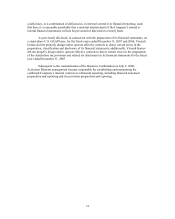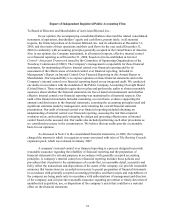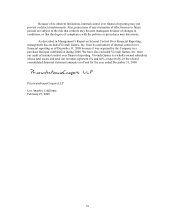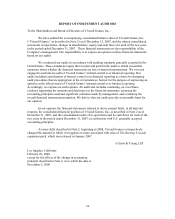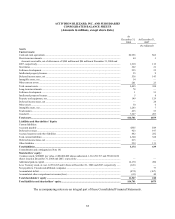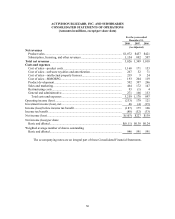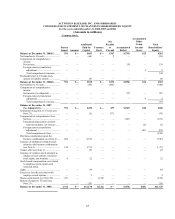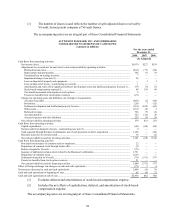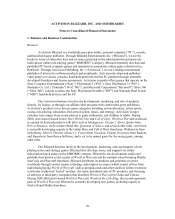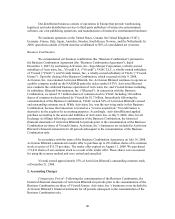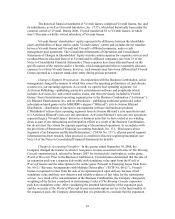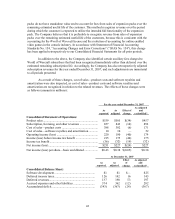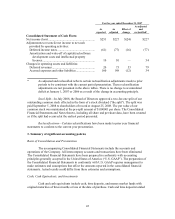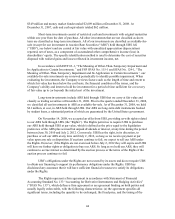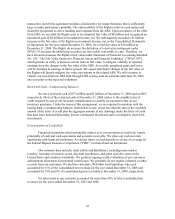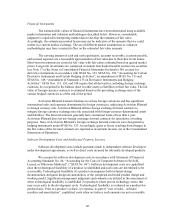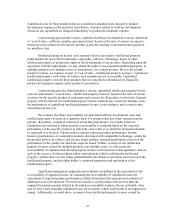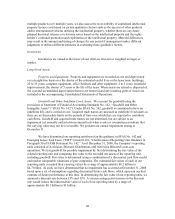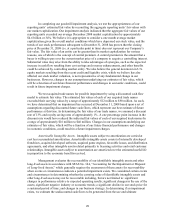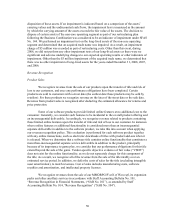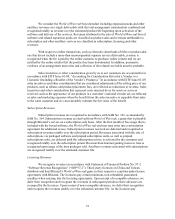Activision 2008 Annual Report Download - page 55
Download and view the complete annual report
Please find page 55 of the 2008 Activision annual report below. You can navigate through the pages in the report by either clicking on the pages listed below, or by using the keyword search tool below to find specific information within the annual report. 41
The historical financial statements of Vivendi Games comprised Vivendi Games, Inc. and
its subsidiaries, as well as Universal Interactive, Inc. (“UI”), which had historically been under the
common control of Vivendi. During 2006, Vivendi transferred UI to Vivendi Games, at which
time UI became a wholly- owned subsidiary of Vivendi Games.
Vivendi Games’ shareholders’ equity represents the difference between the identifiable
assets and liabilities of these entities under Vivendi Games’ control and includes the net transfers
between Vivendi Games and Vivendi and Vivendi’s affiliated companies, under a cash
management pool agreement. The Consolidated Statements of Operations and Consolidated
Statements of Changes in Shareholders’ Equity include certain expenses for corporate services and
overhead that are allocated from or to Vivendi and its affiliated companies (see Note 23 of the
Notes to Consolidated Financial Statements). These expenses have been allocated based on the
specific nature of the expense and/or a formula, which management believes reasonably allocates
expenses to or from Vivendi Games; however, such amounts may have been different had Vivendi
Games operated as a separate stand-alone entity during periods presented.
Change in Segment Presentation—In conjunction with the Business Combination, senior
management changed the manner in which they assess the operating performance of, and allocate
resources to, our operating segments. As a result, we operate four operating segments: (i))
Activision Publishing—publishing interactive entertainment software and peripherals which
includes Activision, Inc. and certain studios, assets, and titles previously included in Vivendi
Games’ Sierra Entertainment operating segment prior to the Business Combination (“Activision”),
(ii) Blizzard Entertainment, Inc. and its subsidiaries—publishing traditional games and online
subscription-based games in the MMORPG category (“Blizzard”), (iii) Activision Blizzard
Distribution—distribution of interactive entertainment software and hardware products
(“Distribution”) (these three operating segments form Activision Blizzard’s core operations) and
(iv) Activision Blizzard’s non-core exit operations. Activision Blizzard’s non-core exit operations
represent legacy Vivendi Games’ divisions or business units that we have exited or are winding
down as part of our restructuring and integration efforts as a result of the Business Combination,
but do not meet the criteria for separate reporting of discontinued operations. In accordance with
the provisions of Statement of Financial Accounting Standards, No. 131, “Disclosures about
Segments of an Enterprise and Related Information,” (“SFAS No. 131”), all prior period segment
information has been restated, when practical, to conform to this new segment presentation (see
Note 14 of the Notes to Consolidated Financial Statements for details).
Change in Accounting Principles—In the quarter ended September 30, 2008, the
Company changed the manner in which it recognizes revenue associated with sales of The Burning
Crusade expansion pack, released in January 2007 for its massively, multi-player, online game,
World of Warcraft. Prior to the Business Combination, Vivendi Games determined that the sale of
an expansion pack was a separate deliverable with standalone value apart from the World of
Warcraft license and the subscription to the online game. Pursuant to Emerging Issues Task Force
No. 00-21 “Revenue Arrangements with Multiple Deliverables” (“EITF No. 00-21”), Vivendi
Games recognized revenue from the sale of an expansion pack upon delivery because it had
standalone value and there was objective and reliable evidence of fair value for the subscription
service. As a result of the consummation of the Business Combination, the Company changed its
weighting of the factors considered in determining if sales of The Burning Crusade expansion
pack have standalone value. After considering the intended functionality of the expansion pack
and the necessity of the World of Warcraft license and subscription service to the functionality of
the expansion pack, the Company determined that it is preferable to conclude that the expansion


